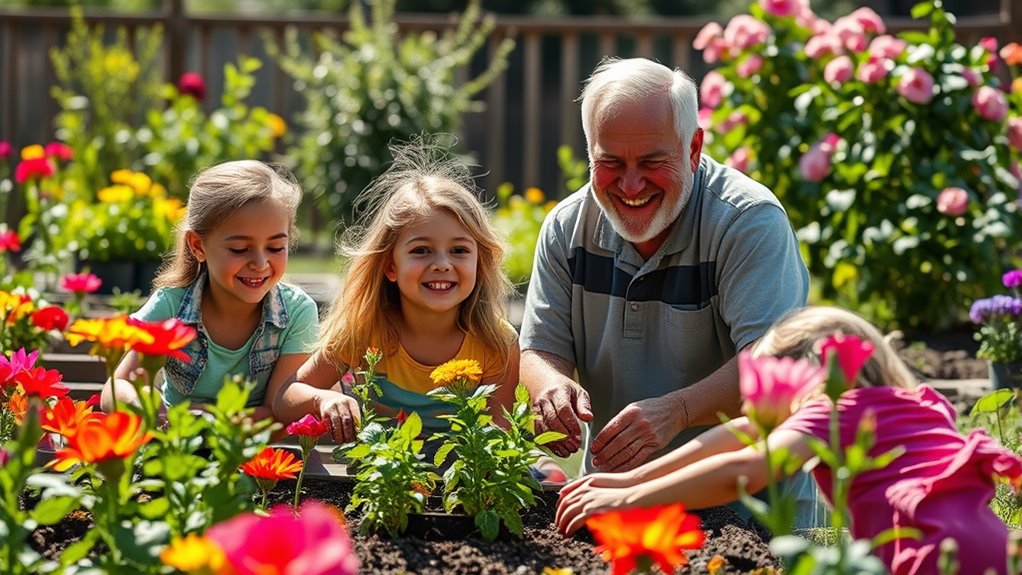Volunteering can be your best medicine because it boosts your mental health, reduces stress, and fights depression. It helps you feel happier and more fulfilled while giving you a sense of purpose during tough times. Plus, it strengthens social connections, builds your self-esteem, and encourages personal growth. By actively helping others, you create positive waves for yourself and your community. Keep exploring to discover more ways that volunteering can transform your life and well-being.
Key Takeaways
- Volunteering reduces stress, combats depression, and boosts happiness, acting as a natural form of self-care for mental health.
- It fosters social connections and community belonging, strengthening support networks and resilience.
- Engaging in volunteer activities enhances self-esteem and provides meaningful purpose, replacing routine boredom.
- Volunteering develops new skills, broadens perspectives, and encourages personal growth and optimism.
- Overall, it improves mental well-being while positively impacting communities, creating a cycle of collective health benefits.

Have you ever wondered how volunteering can positively impact your life? When you dedicate your time and energy to helping others, you’re not just making a difference in their lives—you’re also nurturing your own well-being. Engaging in volunteer work has been shown to boost mental health by reducing stress, combating depression, and increasing feelings of happiness. The act of giving creates a sense of purpose and fulfillment, which can be especially powerful during challenging times. Instead of focusing solely on your own worries, volunteering shifts your attention outward, helping you gain perspective and develop resilience. Furthermore, contributing to your community fosters a sense of belonging and connection. When you see the tangible impact of your efforts—whether it’s helping at a local shelter, tutoring students, or cleaning up a park—you experience a profound sense of community impact. This feeling of being part of something larger than yourself enhances your social support network, which is essential for mental health. You’re likely to form new friendships and strengthen existing ones, creating a support system that can help you navigate life’s ups and downs.
Volunteering encourages active engagement rather than passive consumption, which is indispensable for mental and emotional well-being. It pulls you out of routines that might feel monotonous or unfulfilling and replaces them with meaningful activities. This active participation can lead to a boost in self-esteem, as you see firsthand the positive results of your efforts. The community impact is also undeniable—your work can improve living conditions, support vulnerable populations, and foster stronger neighborhood ties. When you help others, you’re also helping to build a more resilient, connected community. These collective benefits reinforce your sense of purpose and satisfaction, creating a cycle of positive reinforcement that benefits everyone involved.
Additionally, volunteering provides opportunities for personal growth. It pushes you to develop new skills, gain different perspectives, and challenge yourself in ways you might not otherwise. This growth feeds back into your mental health, making you more adaptable and optimistic. The act of giving back isn’t just about helping others; it’s also about investing in yourself. When you see the difference you can make, it often sparks a renewed sense of hope and motivation. Overall, volunteering acts as a natural form of self-care, supporting your mental health while enabling you to contribute meaningfully to your community. The combined effects of community impact and personal well-being make volunteering one of the most effective and rewarding ways to improve your life.
Frequently Asked Questions
How Does Volunteering Impact Mental Health Long-Term?
You might wonder how volunteering impacts your mental health long-term. When you volunteer, you build social connections that provide emotional support and reduce feelings of loneliness. Over time, these connections strengthen your emotional resilience, helping you cope better with stress and life’s challenges. Consistent volunteering can lead to improved mood, increased self-esteem, and a greater sense of purpose, all of which contribute to better mental health over the years.
Can Volunteering Help Reduce Feelings of Loneliness?
Feeling lonely can be overwhelming, but volunteering offers a powerful remedy. By engaging in meaningful activities, you create social connections that boost your emotional well-being. Instead of isolation, you build a sense of community and purpose, which helps reduce loneliness. Volunteering transforms solitude into connection, making you feel valued and less alone. It’s a simple yet effective way to nurture your mental health and foster lasting relationships.
What Are the Best Types of Volunteer Activities for Stress Relief?
You can find stress relief in volunteer activities that promote mindfulness practices, like gardening or working with animals, helping you stay present and calm. Engaging in group activities, such as community clean-ups or supporting local shelters, boosts social connection, which reduces stress. Choose activities that resonate with you, so you feel more engaged and relaxed. These activities provide both mental calmness and meaningful social bonds, making your volunteering experience truly restorative.
How Does Volunteering Influence Physical Health Outcomes?
Volunteering boosts your physical health by encouraging community engagement and increasing physical activity. When you participate in activities like planting trees or helping at events, you move more, which improves your cardiovascular health and boosts your immune system. Additionally, engaging with others reduces stress, lowering blood pressure. Regular volunteering keeps you active and socially connected, leading to better overall health outcomes and a longer, healthier life.
Are There Age-Specific Benefits of Volunteering?
You’ll find that volunteering offers age-related benefits, especially through senior volunteerism. As you age, volunteering helps improve your mental sharpness, boosts social connections, and enhances overall well-being. For seniors, engaging in volunteer activities can reduce loneliness, maintain physical health, and foster a sense of purpose. These age-specific benefits make volunteering a valuable activity at any stage of life, promoting healthier, more fulfilling aging experiences.
Conclusion
Imagine the incredible transformation waiting for you just beyond the next door—more than you ever expected. Volunteering isn’t just about helping others; it’s about discovering a part of yourself you never knew existed. The real question is: are you ready to take that leap and unleash a life-changing experience? Because once you step in, the true magic begins—something you’ll carry with you long after the moment has passed. Will you seize it?









